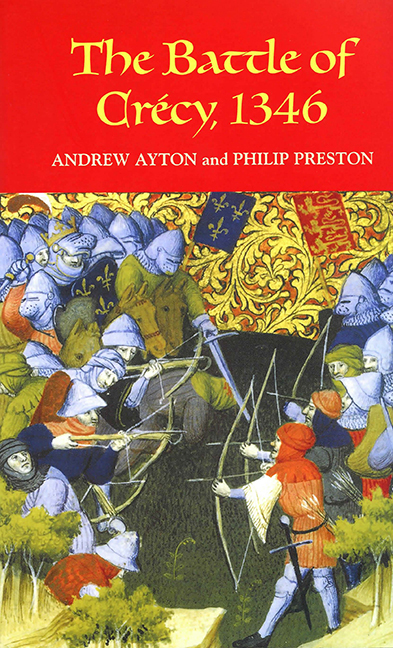Book contents
- Frontmatter
- Contents
- List of Illustrations
- Preface and Acknowledgements
- Abbreviations
- Dedication
- Introduction
- The Campaign
- The Battle
- The English
- The French
- 6 The Nobility of Normandy and the English Campaign of 1346
- 7 Vassals, Allies and Mercenaries: The French Army before and after 1346
- 8 The Battle of Crécy: A Hard Blow for the Monarchy of France
- Sources and Problems of Interpretation
- Index
- Miscellaneous Endmatter
8 - The Battle of Crécy: A Hard Blow for the Monarchy of France
from The French
Published online by Cambridge University Press: 25 October 2017
- Frontmatter
- Contents
- List of Illustrations
- Preface and Acknowledgements
- Abbreviations
- Dedication
- Introduction
- The Campaign
- The Battle
- The English
- The French
- 6 The Nobility of Normandy and the English Campaign of 1346
- 7 Vassals, Allies and Mercenaries: The French Army before and after 1346
- 8 The Battle of Crécy: A Hard Blow for the Monarchy of France
- Sources and Problems of Interpretation
- Index
- Miscellaneous Endmatter
Summary
The ‘déconfiture de Crécy’, which opens a series of three black years – Crécy in 1346, Calais in 1347 and the Black Death of 1348 – holds bitter memories for the French. The disaster of the following year, the fall of Calais, at least had its heroes – the burghers of Calais. Very early on, even before the ‘History of France’ of the Third Republic, and the sculptures of Rodin, Eustache de Saint Pierre and his five companions had a place of honour in the national memory. From the Ancien Régime, a school book, l'Instruction sur l'histoire de France, by Le Ragois, devoted more than a quarter of the chapter on Philip VI to the six burghers. ‘Renown will never forget the name of Eustache de Saint Pierre, the most noble burgher of that time, and his heroic generosity in saving his fellow citizens.’ Nothing like this happened at Crécy, which left only the odious images of knights charging in disorder to gain the first place and the greatest share of glory and spoils, trampling on the Genoese crossbowmen whose wet bowstrings could no longer shoot their deadly quarrels; and, finally, the pitiful image of King Philip VI of Valois, fleeing into the pitch-black night to the closed doors of the ‘château de La Broye’, crying out: ‘Ouvrés, ouvrés, chastelain! C'est l'infortunés rois de France’.
The moral shock
If Crécy remains such an unfortunate memory, it is because at the time France failed to face up to the defeat. Crécy was neither the first nor the last military disaster of the fourteenth and fifteenth centuries, but no other caused such a moral shock.
One has only to read the chronicles of the time, and the pages devoted to the ‘déconfitures’, whether they are written in French or in Latin, by a clerk or a monk, in Normandy or in Flanders, or even in Paris, whether they are recounting events at Courtrai, Crécy, Poitiers, Nicopolis or Agincourt, their story is constructed according to the same scheme. There were worrying omens, a flock of crows or a mouse running under the tent. On the eve of the fatal day, the future victor made peace offerings, which were imprudently rejected. At the council, consisting of the wise and the foolhardy, it was the latter's bad advice that was followed.
- Type
- Chapter
- Information
- The Battle of Crécy, 1346 , pp. 273 - 286Publisher: Boydell & BrewerPrint publication year: 2005



